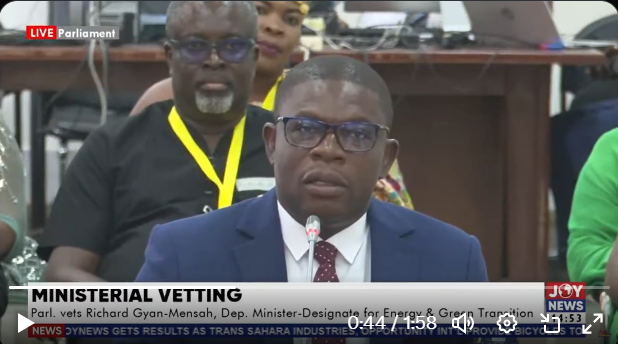Deputy Energy Minister-nominee , Richard Gyan-Mensah, has supported the government’s decision to involve the private sector in some operations of the Electricity Company of Ghana (ECG) to improve efficiency and financial stability.
Appearing before the Appointments Committee of Parliament on Tuesday, February 25, 2025, he emphasized the urgent need for capital injection into ECG to address the challenges facing the company.
“ECG currently needs capital injection. There are a lot of inefficiencies in the system, and I believe that bringing on board the private sector will play a key role in resolving some of these challenges, and also to make them financially buoyant to ensure we have consistent and stable power supply,” he stated.
Richard Gyan-Mensah also acknowledged concerns raised by the Trades Union Congress (TUC) about the privatization of ECG but maintained that the Energy Minister’s approach is in the best interest of Ghana.
Clarifying the government’s position, he stressed that the entire ECG is not being privatized, but rather specific aspects of its operations, particularly billing, distribution, and revenue collection.
“The privatization that is being discussed does not mean the whole ECG is going to be privatized. It is a section of the activities and mainly distribution, billing, and collections is what the government is looking at privatizing to bring in private companies,” he explained.
He assured that local content considerations would be prioritized to ensure that any private sector involvement would not be dominated by foreign entities.
“I have not had an extensive discussion with my minister, but I believe Ghana will prioritize local content. Whatever it is , it will not be left entirely in the hands of foreign players,” he assured the committee.
The Energy Minister, John Jinapor, speaking to the media on the sidelines of a working visit to the West African Gas Pipeline Company Station in Tema, a few days ago revealed the government is seeking private sector participation to enhance efficiency and financial sustainability.
“The news items, the publication and the commentary by some people who should know better that we are selling ECG. It’s not true; it will not be sold, but we want some private sector participation to bring about the high level of efficiency, reduce the losses, increase the revenue base so that we can pay for some of these bills we are talking about,” Mr. Jinapor stated.
The Minister further elaborated on the financial strain caused by inefficiencies in the energy sector. He lamented that resources meant for development projects are being redirected to settle debts owed to energy suppliers, such as the West African Gas Pipeline Company (WAPCo) and N-Gas.
The Minister of Finance under normal circumstances should not be taking the taxpayers’ money which could have been used for other development projects to pay WAPCo. But today we have to squeeze and take money from the budget to pay N-Gas for this $75 million. That could have been used for other developmental projects such as roads, hospitals and other infrastructure projects,” he noted.
Mr. Jinapor reiterated the government’s commitment to improving ECG’s performance by involving the private sector to ensure efficiency, reduce financial losses, and increase revenue.
The debate over the future of ECG comes at a time when the country is facing challenges in the energy sector, with concerns over debts and financial viability. The government maintains that reforms are necessary to sustain the sector without compromising public interest.
Watch video:
Ministerial vetting: Richard Gyan-Mensah states that the Energy Minister’s directive to privatize ECG is in the best interest of Ghana and ECG.#JoyNews pic.twitter.com/HkbjZOtmE2
— JoyNews (@JoyNewsOnTV) February 25, 2025

